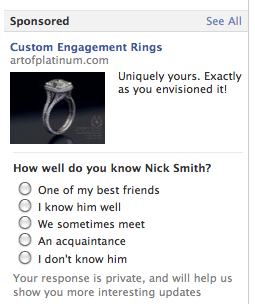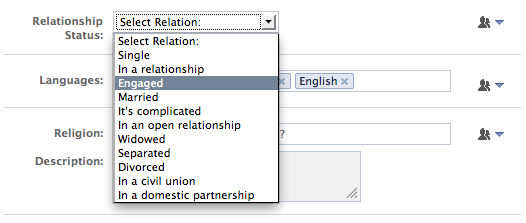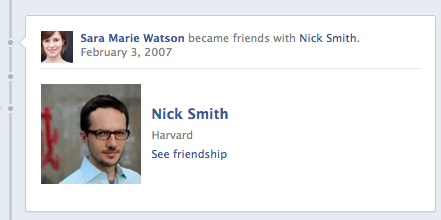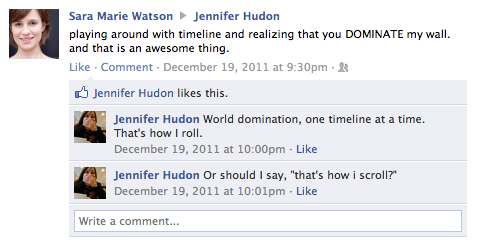I Didn't Tell Facebook I'm Engaged, So Why Is It Asking About My Fiancé?
The morning began with my typical browsing routine: email, top-reads RSS news feed, a brief scan of Twitter, then Facebook. I found friends wrapping up at SXSW, some chatter about Kony, pictures of new babies, and then I noticed something out of the ordinary in the right hand column:

It's not the first time I've gotten an engagement ring advertisement. But what's this? Facebook is directly asking me to comment on the nature of my relationship to Nick Smith? That's something new. And weird.
Because, as it turns out, Nick Smith and I are engaged.
We contacted Facebook to ask them about what might have happened. A spokesman got back to us right away. First, the placement of the ad and the question was an accident. That is to say, Facebook wanted to show me the ad and it wanted to ask me the question, but the fact that they showed up at the same time was coincidental. Second, I was probably targeted for an engagement ring ad because of some things I posted about our wedding or on the basis that I'm a woman of marrying age. Third, Facebook's spokesman said that my answer to the question about Nick was just for Facebook's social graph, not for advertisers.
We did want to share our excitement in other subtle ways, and we further broke the news on Facebook with pictures that spoke for themselves. Nick's album included the post-proposal shot on the beach with the ring prominently featured, and my album depicted a champagne toast with the ring clearly displayed and a snarky but subtle (by algorithmic standards) caption: "yes, that's my left hand." Friends that were close enough to look at vacation photos and perceptive enough to notice the new "bling" posted congratulations and "liked" the shots. And we left it at that.
A year later, my reservations with making our relationship "Facebook official" persist. I keep going back to the way Jaron Lanier puts it in You Are Not a Gadget: "Life is turned into a database...based on [a] philosophical mistake, which is the belief that computers can presently represent human thought or human relationships. These are things computers cannot currently do." I hesitate to sum up such a deeply personal and important fact into a data point in a profile field. Zadie Smith was similarly inspired by Lanier's words, and described how personhood as represented online is somehow lacking: "When a human being becomes a set of data on a website like Facebook, he or she is reduced. Everything shrinks. Individual character. Friendships. Language. Sensibility. In a way it's a transcendent experience: we lose our bodies, our messy feelings, our desires, our fears."

That's just it. A profile field can't possibly contain the moment that we got engaged: the satisfaction of basking in the sun after we fretted over a forecast that called for rain all week, the way time felt slower as the only other person on the beach that morning approached and passed us with his fishing line and his inquisitive terrier. Attempting to post the moment as a status update feels like an inadequate reduction. Describing it in these short paragraphs, outside the boundaries of Facebook, provides the color and space that a status update just doesn't allow.
***
I have no illusions about what Facebook has figured out about me from my activity, pictures, likes, and posts. Friends have speculated about how algorithms might effectively predict hook-ups or dating patterns based on bursts of "Facebook stalking" activity (you know you are guilty of clicking through hundreds of tagged pictures of your latest crush). David Kilpatrick uncovered that Facebook "could determine with about 33 percent accuracy who a user was going to be in a relationship with a week from now." And based on extensive networks of gay friends, MIT's Gaydar claims to be able to out those who refrain from listing their sexual orientation on the network. When I first turned on Timeline, I discovered Facebook had correctly singled out that becoming friends with Nick was a significant event of 2007 (that's when we met and first started dating, and appropriately enough, part of why he joined Facebook).
Since our engagement, there have been enough mentions of "engagement" and "wedding" in mine and my friends' comments littered throughout my profile to suggest to Facebook's keyword crawlers to deduce that we've got something big planned. The fact that he's tagged in my cover photo, we have numerous albums taken in remote locations where we're the only two people tagged, and that we both currently live in Chongqing, China, all should make it obvious to Facebook's relationship-weighing algorithms that we're pretty important to each other.

So shouldn't it also be obvious to Facebook that I "know him well" and he's "one of my best friends?" We wouldn't be tagged in so many pictures together (70) if it weren't true. And could there be any chance at all that "I don't know him" given these data points? Though Facebook isn't outright asking me if we're in a relationship, it sure sounds like that's what they are getting at. Moreover, why hasn't Facebook asked me the same question about someone like Jen Hudon? I share more mutual friends (121) and am tagged in almost as many photos (67) with Jen as I am with Nick, and her wall posts feature prominently in my Timeline. (Facebook might interpret these data points and suggest I choose her as one of my bridesmaids, which I have done). No, Facebook has us figured out: we went to High School together and she's "one of my best friends."

So why does Facebook care to know more about the nature of my relationship to Nick? The short answer is that Facebook wants to know as much as it can about my relationships, even though Facebook's current policy is not use information from user questions like this one for advertising.
My response to the relationship question would act as an important input into the algorithms deciding what shows up in my feed. If I said Nick is "one of my best friends," Facebook might weight his posts more heavily than they already do. For example, my feed has recently been inundated with more posts about my cousins' wife's pregnancy now that I've confirmed him as a family member (though I hide it on my profile for security reasons).
But what happens if I don't want these relationships to alter my feed? This is a "Filter Bubble" problem, where Facebook's personalization algorithm is opaque to us as users. I don't know what I'm missing, but I can tell that I'm seeing more of certain people as a result of declaring a certain kind of relationship to them. But there's no master switch board for us to tweak the dials on our social filters; if I'm seeing too many of a certain friend's posts, I have only the binary choice of turning them on or off, and I have to alter that detail on a person by person basis. Any other input into the algorithm requires a fair amount of proactive and clever gaming of the system (like declining family member requests to avoid filtration). And who wants to explain to Aunt Joan that's why you can't confirm she's your aunt?
And if I did change my relationship status to engaged -- not just answer the question Facebook posed to me -- the company could then target ads based on that information. We've seen how pregnancies are a pivotal marketing opportunity for companies like Target. Marriage is another big life event where habits, loyalties, and purchasing behaviors change. And then there's the brief but highly lucrative wedding planning and purchasing period itself; it's a critical and fleeting moment that marketers are eager to pin down. It comes as no surprise that Facebook and its advertisers would want to know what stage of life I'm in right at this moment. They want to know if they could be making more money showing me engagement ring, registry, or mortgage advertisements. For the most part, that targeting is harmless, but it's gold to Facebook and advertisers to know that I've shifted demographic categories. I imagine that my literal value in terms of price per click might even go up as I enter into the "engaged" category.
***
And even though the pairing of the carefully phrased question and advertising were coincidental, it's as if Facebook is saying, "I know you guys have been together for a while now, shouldn't you be thinking about getting engaged soon?" Hint hint, nudge nudge. And then it comes off as a sassy girlfriend shouting over martinis, "Girl, when's he gonna put a ring on it?" So Facebook isn't outright asking me if I'm engaged. But I find myself reading for subtext as I would an aunt's pointed but tactfully indirect question.
I literally laughed out loud when I first noticed the question because we are, in fact, engaged. But what if we weren't? What if we had decided that the institution wasn't for us? What if we'd just had a huge fight about the fact that we're not yet engaged? Would Facebook ask the same of an algorithmically deduced gay couple? And why is Facebook getting all up in my personal business?!
It's hard not to read a direct question like this and not find insidious moralizing and judgment behind it. When our algorithms start poking into our personal lives like a persistently pestering grandmother, we have to take a step back. Does Facebook need to know everything about me? Timeline is ready at the wait to display all my important life events for me, and in exchange those details will help Facebook target my life situation with pinpoint accuracy. Do I care if they show me local venues and photographers as a result keywords and relationship statuses? Not really. But do I care that Facebook is asking me to better define my relationship with my fiancé? Yes. Very much.
That's where this crosses a line for me. It's not just recognition of what Facebook knows about me (after I've willingly given them a lot). Now they're asking me for more. This is the first instance I've come across where Facebook asked me outright to define myself by their categories. And as Douglass Rushkoff has advised, "you may always choose none of the above."
Of course, the algorithm didn't think to ask me this question on its own. Some Facebook engineer decided that there are a number of people who aren't stating their relationship status, but that there is enough data to suggest otherwise, so why don't we prompt those users to be a little more specific so we can better target them? The message is careful to confirm that this won't be used publicly (assuming that's why one wouldn't post a relationship status in the first place), but that it will improve your overall Facebook experience. A straightforward reading says that if I answer, Facebook knows a little more about me to better target ads and populate my news feed. But those engineers who designed the question and answers left out the closest relationship type, "more than friends." Facebook isn't (yet) going so far as to redirect me to fill out my relationship status, but it can remind me that I might want to do so. And this is their not-so-subtle way of doing that.
This example seems to suggest to me that it is well within Facebook's collected trove of data and technical capability to start asking more pointed questions, if the engineers are bold enough to keep asking. It's not so hard to imagine a follow up asking, "Are you and Nick Smith engaged?" Or prompting me to confirm something like "Is Marjorie Watson your mother?" based on our shared last name and frequency of her posts on my wall. "Engaged" and "mother" are clearly defined social relationships. Though Facebook offers a lot of options for relationship status including civil unions, domestic partnerships, and the all-encompassing and fraught "it's complicated," it's the regimented nature of this defined set that gets me worried. Our programs and their programmers are making design and engineering choices that have the potential to influence how we think of and define ourselves on a broader scale.
In Alexis Madrigal's response to Zadie Smith he writes, "You get to determine your level of investment in the digital world around you. You get to choose the people you listen and talk to. You have control over your data. You get to define who you are, no matter what your Facebook profile says. All that is not lost unless we choose to lose it." I couldn't agree more. We are not defined by our social profiles, but what happens when we Facebook starts to introduce new social behaviors into our personal lives? For many couples , making a relationship "Facebook official" is as important a milestone as the first time they utter those three little words. It's a line item in the relationship progression discussion checklist, on par with or perhaps even replacing the "are we exclusive" or "are you my boyfriend/girlfriend" talks. Even if you choose not to link to each other's profile by naming your significant other, it's a public (and feed-publicized) statement of commitment. But how did Facebook insert itself into our most personal relationships like this? As I think my writing this article makes clear, for me, this isn't even a privacy issue. It's more about my relationship to the machine, and the scary glimpse I just got of where design decisions and algorithmic assumptions are heading.
The good news: only a human can confirm or deny the status of relationship. For now.